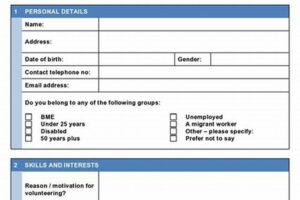Table of Contents
In the darkest moments of life, when hope seems lost and the weight of the world feels unbearable, there are people who step forward to offer a lifeline – crisis line volunteers.
These dedicated individuals are the unsung heroes of our communities, providing a listening ear, a compassionate heart, and a lifeline to those in need. With empathy and understanding, they help callers navigate through their toughest challenges, offering support and guidance along the way.
Let’s delve into the world of crisis line volunteers, exploring their motivations, the challenges they face, and the profound impact they have on the lives of those they serve.
crisis line volunteer
Selfless individuals offering support in times of crisis.
- Providing a listening ear
- Offering emotional support
- Preventing suicide and self-harm
- Guiding through tough challenges
- Promoting mental well-being
- Reducing isolation and loneliness
- Connecting to resources and services
- Empowering individuals in distress
- Making a difference in lives
- Saving lives
Crisis line volunteers are everyday heroes who make a profound impact on the world, one conversation at a time.
Providing a listening ear
At the heart of every crisis line volunteer’s role is the ability to provide a listening ear to those in distress. This seemingly simple act is a powerful tool in helping callers feel heard, understood, and less alone.
- Non-judgmental presence:
Crisis line volunteers offer a safe space where callers can share their innermost thoughts and feelings without fear of judgment. They create an environment of acceptance and empathy, allowing callers to express themselves freely and openly.
- Active listening:
Volunteers practice active listening skills, paying full attention to the caller’s words, tone of voice, and emotional cues. They demonstrate their understanding by reflecting and summarizing the caller’s concerns, ensuring that they feel truly heard and understood.
- Empathetic connection:
Crisis line volunteers connect with callers on a human level, showing genuine care and concern. They put themselves in the caller’s shoes, trying to understand their perspective and validate their feelings. This empathetic connection helps callers feel supported and less alone in their struggles.
- Creating a safe space:
Volunteers create a safe and confidential space for callers to share their stories. They assure callers that their conversations will remain private and that they are there to support them without judgment. This sense of safety encourages callers to open up and seek the help they need.
By providing a listening ear, crisis line volunteers help callers feel heard, understood, and supported. This simple act can make a world of difference to someone in crisis, helping them feel less alone and empowering them to take the next steps towards healing and recovery.
Offering emotional support
Crisis line volunteers go beyond simply listening to callers; they offer emotional support and guidance to help callers navigate through their toughest moments. This support can take many forms, depending on the caller’s needs.
- Empathetic understanding:
Volunteers show empathy and understanding towards callers, acknowledging their feelings and validating their experiences. They help callers feel heard and understood, which can be a powerful source of comfort and support.
- Reassurance and encouragement:
Volunteers offer reassurance and encouragement to callers, helping them to see that there is hope and that they are not alone. They remind callers of their strengths and resilience, and help them to focus on the positive aspects of their lives.
- Problem-solving and coping strategies:
Volunteers help callers identify and explore their options for coping with their challenges. They may suggest practical strategies for managing difficult emotions, resolving conflicts, or dealing with specific stressors. They also help callers connect with resources and services that can provide ongoing support.
- Crisis intervention:
In emergency situations, volunteers provide crisis intervention support, helping callers to stay safe and calm. They may assist callers in developing a safety plan, connecting with emergency services, or finding immediate shelter or support.
By offering emotional support, crisis line volunteers help callers feel less alone, more hopeful, and better equipped to cope with their challenges. They provide a lifeline of support during some of life’s most difficult moments, helping callers to find the strength and resilience to move forward.
Preventing suicide and self-harm
One of the most critical roles of crisis line volunteers is preventing suicide and self-harm. When someone is in crisis, they may feel like suicide or self-harm is their only way out. Crisis line volunteers are trained to recognize the signs of suicidal ideation and self-harm and to intervene to keep callers safe.
- Assessing risk:
Volunteers are trained to assess the caller’s risk of suicide or self-harm. They ask specific questions to determine the caller’s level of intent, access to means, and protective factors. This assessment helps volunteers determine the best course of action to keep the caller safe.
- Providing immediate support:
If a caller is at imminent risk of suicide or self-harm, volunteers provide immediate support to help keep them safe. This may involve talking the caller down from a crisis, connecting them with emergency services, or helping them develop a safety plan.
- Developing a safety plan:
A safety plan is a written or verbal agreement between the caller and the volunteer that outlines specific steps the caller will take to stay safe. This may include things like calling a friend or family member, going to a safe place, or contacting a mental health professional.
- Connecting to resources:
Volunteers help callers connect with resources and services that can provide ongoing support and treatment. This may include mental health professionals, crisis support services, or peer support groups. Volunteers also help callers to access basic needs such as food, shelter, and clothing.
By preventing suicide and self-harm, crisis line volunteers save lives. They provide a lifeline of hope to those who are struggling with suicidal thoughts or self-harming behaviors, and they help them to find the support they need to stay safe and move forward with their lives.
Guiding through tough challenges
Crisis line volunteers provide more than just emotional support; they also offer guidance and assistance to callers who are struggling with tough challenges in their lives. These challenges can range from relationship problems and financial difficulties to mental health issues and addiction.
Volunteers are trained to listen actively and to ask open-ended questions that help callers explore their challenges and identify their strengths. They help callers to develop coping strategies, problem-solve, and access resources that can help them overcome their difficulties.
Here are some specific ways that crisis line volunteers guide callers through tough challenges:
1. Identifying and understanding the challenge: Volunteers help callers to identify the root causes of their problems and to understand how these problems are affecting their lives. This process of self-awareness is essential for developing effective coping strategies.
2. Developing coping strategies: Volunteers help callers to develop healthy coping mechanisms for dealing with stress, anxiety, and other difficult emotions. These strategies may include relaxation techniques, mindfulness exercises, or creative outlets.
3. Problem-solving: Volunteers help callers to break down their problems into smaller, more manageable steps. They work with callers to develop a plan for addressing each step and to identify resources that can help them achieve their goals.
4. Connecting to resources: Volunteers help callers to connect with a wide range of resources that can provide support and assistance. These resources may include mental health professionals, social service agencies, support groups, and online resources.
By guiding callers through tough challenges, crisis line volunteers help them to build resilience, overcome obstacles, and move forward with their lives.
Promoting mental well-being
Crisis line volunteers play a vital role in promoting mental well-being by providing support, guidance, and resources to callers who are struggling with mental health issues. These issues may include depression, anxiety, post-traumatic stress disorder (PTSD), bipolar disorder, and schizophrenia.
Volunteers are trained to recognize the signs and symptoms of mental health problems and to respond in a supportive and non-judgmental manner. They help callers to understand their mental health condition and to develop coping strategies for managing their symptoms.
Here are some specific ways that crisis line volunteers promote mental well-being:
1. Providing emotional support: Volunteers offer a listening ear and a safe space for callers to talk about their feelings and experiences. They provide empathy, compassion, and understanding, which can help callers to feel less alone and isolated.
2. Psychoeducation: Volunteers provide callers with information about mental health conditions, including symptoms, causes, and treatment options. This information can help callers to better understand their condition and to make informed decisions about their care.
3. Skill-building: Volunteers help callers to develop coping skills for managing their mental health symptoms. These skills may include relaxation techniques, mindfulness exercises, problem-solving strategies, and communication skills.
4. Connecting to resources: Volunteers help callers to connect with mental health professionals, support groups, and other resources that can provide ongoing support and treatment. They also help callers to access basic needs such as food, shelter, and clothing, which are essential for maintaining mental well-being.
By promoting mental well-being, crisis line volunteers help callers to recover from mental health crises, to manage their symptoms, and to live fulfilling and productive lives.
Reducing isolation and loneliness
Isolation and loneliness are major risk factors for mental health problems and suicide. Crisis line volunteers play a vital role in reducing isolation and loneliness by providing a listening ear and a caring presence to callers who are feeling alone and disconnected.
Volunteers are trained to actively listen to callers and to respond in a supportive and non-judgmental manner. They help callers to feel heard, understood, and less alone. They also provide callers with information and resources that can help them to connect with others and to build a sense of community.
Here are some specific ways that crisis line volunteers reduce isolation and loneliness:
1. Providing a listening ear: Volunteers offer a non-judgmental and confidential space for callers to talk about their feelings and experiences. This can be especially important for callers who feel like they have no one else to talk to.
2. Building rapport: Volunteers take the time to get to know callers and to build rapport with them. This helps callers to feel safe and supported, and it makes them more likely to open up about their problems.
3. Connecting callers to resources: Volunteers help callers to connect with resources that can help them to reduce their isolation and loneliness. These resources may include support groups, community centers, and online forums.
4. Encouraging social interaction: Volunteers encourage callers to engage in social activities that can help them to connect with others and to build a sense of community. These activities may include volunteering, taking a class, or joining a club.
By reducing isolation and loneliness, crisis line volunteers help callers to feel more connected to others and to their community. This can lead to improved mental health and well-being.
Connecting to resources and services
Crisis line volunteers play a vital role in connecting callers to resources and services that can help them to address their immediate needs and to recover from crisis. These resources may include mental health professionals, social service agencies, support groups, and financial assistance programs.
Volunteers are trained to assess callers’ needs and to identify the most appropriate resources to meet those needs. They also help callers to overcome barriers to accessing care, such as lack of transportation or insurance.
Here are some specific ways that crisis line volunteers connect callers to resources and services:
1. Providing information about resources: Volunteers provide callers with information about resources that are available in their community, including mental health services, social service agencies, and support groups. They also provide information about how to access these resources, such as contact information and hours of operation.
2. Making referrals: Volunteers can make referrals to specific resources, such as mental health professionals or social service agencies. This can help callers to get the help they need quickly and easily.
3. Advocating for callers: Volunteers can advocate for callers who are having difficulty accessing resources. For example, they can help callers to appeal denied insurance claims or to find transportation to appointments.
4. Following up with callers: Volunteers may follow up with callers to see how they are doing and to ensure that they are connected to the resources they need. This can help callers to stay engaged in treatment and to avoid future crises.
By connecting callers to resources and services, crisis line volunteers help them to get the help they need to recover from crisis and to improve their lives.
Empowering individuals in distress
Crisis line volunteers empower individuals in distress by helping them to develop the skills and resources they need to cope with their challenges and to move forward with their lives. This empowerment process can take many forms, depending on the individual’s needs.
Volunteers may help callers to identify their strengths and resiliencies, to develop coping strategies, to set goals, and to take action to improve their lives. They may also help callers to connect with resources and services that can provide ongoing support and assistance.
Here are some specific ways that crisis line volunteers empower individuals in distress:
1. Building self-awareness: Volunteers help callers to develop a deeper understanding of themselves, including their strengths, weaknesses, and values. This self-awareness can help callers to make more informed decisions and to take more control of their lives.
2. Developing coping skills: Volunteers help callers to develop coping skills for managing stress, anxiety, and other difficult emotions. These skills may include relaxation techniques, mindfulness exercises, and problem-solving strategies.
3. Setting goals: Volunteers help callers to set realistic and achievable goals for themselves. This can help callers to focus their energy and to make progress towards a better future.
4. Taking action: Volunteers encourage callers to take action to improve their lives. This may involve making changes to their lifestyle, seeking professional help, or reaching out to others for support.
By empowering individuals in distress, crisis line volunteers help them to regain control of their lives and to move forward with hope and resilience.
Making a difference in lives
Crisis line volunteers make a profound difference in the lives of the people they serve. By providing a listening ear, offering support, and connecting callers to resources, volunteers help callers to navigate some of life’s most difficult challenges. This can have a ripple effect, positively impacting not only the callers themselves, but also their families, friends, and communities.
- Saving lives:
Crisis line volunteers save lives by preventing suicide and self-harm. When someone is in crisis, volunteers provide immediate support and help them to develop a safety plan. This can make all the difference between life and death.
- Improving mental health:
Crisis line volunteers help callers to improve their mental health by providing emotional support, guidance, and resources. This can help callers to cope with stress, anxiety, depression, and other mental health challenges.
- Reducing isolation and loneliness:
Crisis line volunteers help callers to reduce isolation and loneliness by providing a listening ear and a caring presence. This can make a big difference for people who are feeling alone and disconnected.
- Empowering individuals:
Crisis line volunteers empower individuals by helping them to develop coping skills, set goals, and take action to improve their lives. This can lead to increased self-confidence, resilience, and hope.
The impact of crisis line volunteers is immeasurable. They are there for people in their darkest moments, offering hope and support. They help callers to find the strength to carry on, and they make a real difference in the world.
Saving lives
Crisis line volunteers save lives by preventing suicide and self-harm. When someone is in crisis, volunteers provide immediate support and help them to develop a safety plan. This can make all the difference between life and death.
- Assessing risk:
Volunteers are trained to assess the caller’s risk of suicide or self-harm. They ask specific questions to determine the caller’s level of intent, access to means, and protective factors. This assessment helps volunteers to determine the best course of action to keep the caller safe.
- Providing immediate support:
If a caller is at imminent risk of suicide or self-harm, volunteers provide immediate support to help keep them safe. This may involve talking the caller down from a crisis, connecting them with emergency services, or helping them to develop a safety plan.
- Developing a safety plan:
A safety plan is a written or verbal agreement between the caller and the volunteer that outlines specific steps the caller will take to stay safe. This may include things like calling a friend or family member, going to a safe place, or contacting a mental health professional.
- Connecting to resources:
Volunteers help callers to connect with resources and services that can provide ongoing support and treatment. This may include mental health professionals, crisis support services, or peer support groups. Volunteers also help callers to access basic needs such as food, shelter, and clothing.
Crisis line volunteers play a vital role in preventing suicide and saving lives. They are there for people in their darkest moments, offering hope and support. They help callers to find the strength to carry on, and they make a real difference in the world.
FAQ
Here are some frequently asked questions about volunteering on a crisis line:
Question 1: What kind of training do I need to become a crisis line volunteer?
Answer 1: The specific training requirements vary depending on the crisis line, but most require volunteers to complete a comprehensive training program. This training typically covers topics such as suicide prevention, crisis intervention, active listening, and self-care.
Question 2: What are the time commitments involved in volunteering on a crisis line?
Answer 2: The time commitments vary depending on the crisis line, but most require volunteers to commit to a certain number of hours per week or per month. Some crisis lines offer flexible scheduling options to accommodate volunteers’ busy schedules.
Question 3: What kind of support can I expect to receive as a crisis line volunteer?
Answer 3: Crisis line volunteers typically receive ongoing support and supervision from trained staff members. This support may include regular check-ins, debriefing sessions, and access to resources and materials to help volunteers stay safe and effective in their role.
Question 4: What are the challenges of volunteering on a crisis line?
Answer 4: Volunteering on a crisis line can be challenging at times. Volunteers may be exposed to difficult and emotionally charged situations, and they may need to deal with their own feelings of stress and compassion fatigue. However, most volunteers find that the rewards of volunteering far outweigh the challenges.
Question 5: What are the rewards of volunteering on a crisis line?
Answer 5: Volunteering on a crisis line can be a rewarding and fulfilling experience. Volunteers have the opportunity to make a real difference in the lives of people who are struggling, and they can develop valuable skills and experience that can benefit them in their personal and professional lives.
Question 6: How can I find a crisis line to volunteer for?
Answer 6: There are many ways to find a crisis line to volunteer for. You can search online, contact your local mental health center, or ask your friends and family for recommendations. Once you find a crisis line that you’re interested in volunteering for, you can typically apply online or by contacting the organization directly.
If you have additional questions about volunteering on a crisis line, please don’t hesitate to contact the crisis line organization directly. They will be happy to answer your questions and help you get started as a volunteer.
Now that you have a better understanding of what it takes to be a crisis line volunteer, here are some tips to help you get started:
Tips
Here are some practical tips to help you get started as a crisis line volunteer:
Tip 1: Be a good listener.
Active listening is one of the most important skills for a crisis line volunteer. When a caller is talking to you, give them your full attention and try to understand their perspective. Don’t interrupt them, and don’t try to change the subject. Just listen and be there for them.
Tip 2: Be empathetic.
Empathy is the ability to understand and share the feelings of another person. When you’re talking to a caller, try to put yourself in their shoes and imagine how you would feel if you were going through what they’re going through. This will help you to connect with the caller on a deeper level and provide them with the support they need.
Tip 3: Be patient.
It’s important to be patient with callers, especially if they’re upset or agitated. Don’t rush them, and don’t try to force them to talk about something they’re not ready to talk about. Just let them talk at their own pace, and be there for them when they’re ready to open up.
Tip 4: Take care of yourself.
Volunteering on a crisis line can be emotionally challenging, so it’s important to take care of yourself. Make sure to get enough sleep, eat healthy foods, and exercise regularly. It’s also important to have a support system in place, such as friends, family members, or other volunteers, who you can talk to about your experiences.
By following these tips, you can become an effective and compassionate crisis line volunteer who makes a real difference in the lives of people who are struggling.
If you’re interested in volunteering on a crisis line, I encourage you to learn more about the opportunities in your community. Volunteering on a crisis line is a rewarding experience that can make a real difference in the world.
Conclusion
Crisis line volunteers are everyday heroes who make a profound difference in the lives of people who are struggling. They provide a listening ear, offer emotional support, and connect callers to resources that can help them to cope with their challenges and move forward with their lives.
Crisis line volunteers are trained to provide compassionate and effective support to callers in crisis. They are skilled at active listening, empathy, and problem-solving. They are also committed to taking care of themselves, so that they can be there for callers when they need them most.
If you are interested in volunteering on a crisis line, I encourage you to learn more about the opportunities in your community. Volunteering on a crisis line is a rewarding experience that can make a real difference in the world.
Here are some key points to remember about crisis line volunteers:
- They are everyday people who make a big difference.
- They provide a listening ear and emotional support to callers in crisis.
- They connect callers to resources that can help them to cope with their challenges.
- They are trained to provide compassionate and effective support.
- They are committed to taking care of themselves, so that they can be there for callers when they need them most.
If you or someone you know is struggling, please reach out to a crisis line. There is help available, and you are not alone.






